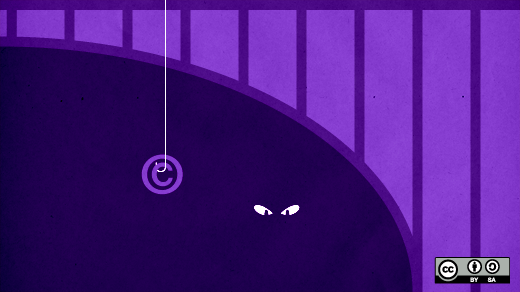Some time ago, at the very beginning of opensource.com, I wrote a post on the possibility of using some archaic forms of law – champerty, barratry and maintenance – against patent trolls. And lo and behold someone is taking a run at it, although against a copyright troll, not a patent troll.
A company called Righthaven is in the business of suing bloggers for copyright infringement in a particularly trollish way. Righthaven has made deals with at least two newspapers – the Las Vegas Review-Journal and the Denver Post – to go after those who republish portions of their articles. Righthaven finds the copying, only THEN does the newspaper assign the copyright to Righthaven, and then Righthaven sues the blogger without warning. No, "gee, I think you borrowed a little too much, could you take it down," because that would ruin Righthaven's business model, which is to extract sums of money from unsuspecting bloggers for less than it will cost them to defend the lawsuit. That's not my opinion of the business model, that's a judge's.
Righthaven also engages in some, um, questionable behavior for someone who, in theory, is simply trying to stop unauthorized copying. According to one complaint, when copying a clip, the Denver Post automatically added text that said "Read More: [article title] – The Denver Post [link]." You'd keep it there, right, cause you're happy to link back? But it really is a Trojan horse, allowing The Denver Post to identify uniquely those who copy its articles so Righthaven could sue them.
Righthaven's setbacks in this scheme have been legion. It lost to a fair use defense on a motion to dismiss (unheard of procedurally), lost a fair use defense when a whole article was republished (rare), and has been countersued in a class action. Most significantly though, it turns out that Righthaven doesn't even have the right to sue. Under copyright law, one cannot transfer just the right to file a lawsuit; in order to sue one also must have the legal right to exclude others from what you claim is infringed, a principle known as "standing." Based on the diligent work of the Electronic Frontier Foundation in getting the relevant documents, though, we have learned that the newspapers effectively kept all control over the copyrights themselves and transferred to Righthaven only the (non-existent) right to file lawsuits. As a result, the court ruled that Righthaven doesn't have standing, three suits have been dismissed so far, and hundreds probably will be.
So what does this add up to? One defendant in South Carolina hopes that it adds up to barratry. Dana Eiser, sued by Righthaven for copying an article from the Denver Post, has sued Righthaven back, claiming that Righthaven's business practices are a form of barratry and thus an unfair trade practice. In South Carolina (it's a state law claim, so the contours will vary from state to state), "Any person who shall willfully bring, prosecute or maintain an action and has no direct or substantial interest in the relief thereby sought shall be guilty of the crime of barratry." Not actually owning any exclusive right that is infringed, yet bringing lawsuits, sounds a lot like not having a "direct or substantial interest in the relief thereby sought."
Is this something that can be done in patent troll suits? The same principle is true, that only the owner of the exclusive patent rights has standing. Admittedly, the "Strategic Alliance Agreement" between Righthaven and the owner of the Las Vegas Review-Journal (we haven't seen the one with the Denver Post yet) demonstrates that the Las Vegas Review-Journal wanted to have its cake and eat it too. It wanted to retain control over the copyrights but, for some reason, not dirty its own hands with the lawsuits. So maybe it's an anomoly and not something others are doing. But there are often mysteries around the financial relationship between an inventor and the troll company, or the various interrelated companies, in patent troll lawsuits. If we start really digging, might we find some barratry going on there too?







7 Comments